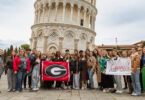Athens, Ga. – The Georgia Review at the University of Georgia will present two events Nov. 11 featuring renowned poet Andrew Hudgins, who comes to Athens as part of his tour on the statewide Georgia Poetry Circuit.
From 3-4 p.m. Hudgins will discuss “Poetry and Humor” in Room 214 of the Miller Learning Center. The talk will be based in part on Hudgins’ most recent books, “A Clown at Midnight: Poems” (2013) and “The Joker: A Memoir” (2013).
At 7 p.m., Hudgins will give a poetry reading at Ciné, 234 West Hancock Ave. in downtown Athens. Both events are free and open to the public, and are part of UGA’s Spotlight on the Arts Festival.
Hudgins’ books of poetry include “American Rendering: New and Selected Poems” (2010), “Ecstatic in the Poison” (2003), “Babylon in a Jar” (1998), “The Glass Hammer: A Southern Childhood” (1994), “The Never-Ending: New Poems” (1991), which was a finalist for a National Book Award, “After the Lost War: A Narrative” (1988), which received the Poetry Prize, and “Saints and Strangers” (1985), which was a finalist for the Pulitzer Prize. In addition to “The Joker: A Memoir,” he is also the author of another book of essays, “The Glass Anvil” (1997). His awards and honors include the Witter Bynner Award for Poetry, the Hanes Poetry Prize and fellowships from the Bread Loaf Writers’ Conference, the Ingram Merrill Foundation and the National Endowment for the Arts. Hudgins has taught at Baylor University and University of Cincinnati; he currently teaches at Ohio State University.
Hudgins’ “After the Lost War: A Narrative” looks at the Civil War. The book is a series of dramatic monologues recounting the life of Georgia poet and Confederate soldier Sidney Lanier.
“Though the poems are all spoken by a character I call Sidney Lanier, the voice of these poems will be unfamiliar to anyone who knows the writings of this historical figure,” Hudgins wrote in the book’s preface. “Despite his having been dead for over a hundred years now, I’d like to thank Lanier for allowing me to use the facts of his life- more or less-to see how I might have lived it if it had been mine. And, in too many ways, I suppose it has.”
Garden & Gun magazine recently praised Hudgins’ memoir “The Joker,” calling it “a shot across the bow of contemporary thought. If we’re lucky, it will stir up an American dialogue about all kinds of fascinating, lurid, confounding, important subjects that reside in the great undertow of jokes.”
In addition to Hudgins, two other circuit poets will visit Ciné in Athens during the 2013-14 academic year: Sandra Beasley on Feb. 7 at 7 p.m. and Steve Gehrke, April 2 at 7 p.m.
The Georgia Poetry Circuit, founded in 1985, is a consortium of 10 colleges and universities that annually brings three poets of national and international reputation to the member campuses, providing access to the literary arts for Georgia residents. The Georgia Review, the internationally prominent literary quarterly published from the University of Georgia since its inception in 1947, has been a supporter of the Circuit since its founding.
For more information, contact The Georgia Review at 706-542-3481, or see www.thegeorgiareview.com or the official website of the Georgia Poetry Circuit, http://www.berry.edu/gpc/.
An excerpt from Hudgins’ “A Clown at Midnight: Poems” is provided
Birth of a Naturalist
Among moist bromeliads
I was bored, and the soft-fingered
ferns annoyed me like an aunt
touching my face and trailing
her fingers down my cheek.
What was I, a possession?
In the gift shop where I desired
nothing, a stranger confused
boredom for balked desire
and bought me a small pot
with a blunt nub, like a toad’s
brown snout, jutting
from dry soil. “Thank you,” I said.
“Thank you,” as I’d been taught,
and she departed, a plump whorl
of black hair and red scarves.
In my pocket, the pot rode
my thigh like a damp stone,
and because it was a secret,
my secret, I began to love it.
The next day the toad’s
tumescent snout, now mossy green,
cracked the packed dirt.
On the windowsill a rickety stalk
rose and kept rising, rising
until it fell into my bed,
and with the toppled orchid in my arms,
I slept until Mother’s laughter
woke me, and I was shamed.
Again in secret, I tucked
its roots in spongy humus
beyond our lawn, where, spindly
and limp-leafed, it dwindled.
Now when I stretch out
over its absence, the coarse
vigor of its killers cushions me,
and I see the lost
orchid animating bracken,
buckthorn, buttercup, and bramble.
Morning glory overclimbs it all,
green on green, blaring
its beautiful and murderous
alabaster trumpets
while twizzling vines unfurl,
spin in sunlight, and, clutching,
caress my face.








